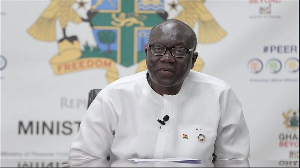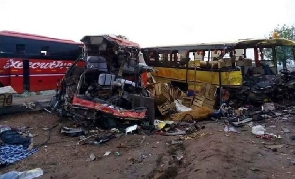Business News of Thursday, 22 April 2021
Source: classfmonline.com
17 million plus MoMo accounts fertile ground for e-commerce – Deputy BoG Governor
The 17 million mobile money accounts in Ghana provide a prolific base for e-commerce, First Deputy Governor of the Bank of Ghana, Dr Maxwell Opoku-Afari has observed.
In his speech at the 5TH CEO Summit held on 20 April 2021 on the theme: ‘Digital Transformation: Powering Business and Government Reset for a Post-Pandemic Economic Resilience – A Public-Private Sector Dialogue’, Dr Opoku-Afari said: “Obviously, the more than 17 million active mobile money accounts, provides ample evidence of the increasing adoption of digital payments and provide a fertile ground for businesses to explore digital channels to interact with customers”.
“I must emphasise that the financial sector digitisation programme is part of the bigger project of the government in a bid to formalise the economy through digital technology”, he noted.
Read Dr Maxwell Opoku-Afari’s full speech below:
“DIGITAL TRANSFORMATION: Powering Business and Government RESET for a Post-Pandemic Economic Resilience – A Public-Private Sector Dialogue”
A Speech by the First Deputy Governor, Dr Maxwell Opoku-Afari at the 5TH CEO Summit 20th April 2021
The Chairman of the 5th CEO Summit CEO and Founder of the CEO Summit Captains of Industry Distinguished Guests Ladies and Gentlemen All Protocols Observed A very Good Morning to you all.
1. It is a pleasure to share a few words with you at the launch of the 5th CEO Summit. I would like to thank the CEO and Founder of the CEO Summit for the honour to speak at this august function.
2. The theme for this year’s summit, “DIGITAL TRANSFORMATION: Powering Business and Government RESET for a Post-Pandemic Economic Resilience. A Public-Private Sector Dialogue” is an excellent one for this present time as we seek to re-position the economy on a path of recovery and sustainable growth post-COVID-19 pandemic. The theme is also more appropriate within the context of how the economy has leveraged digitalisation and other forms of electronic payments to navigate the pandemic to ensure that businesses and economic activity were almost seamless.
3. In fact, one school of thought posits that, if properly harnessed over the medium term, resetting the economy to fully harness the ongoing process of digitisation is what will trigger structural reforms and economic transformation in developing economies, with Ghana at the forefront.
4. Over the past few years, the Bank of Ghana, through carefully crafted strategies, has been implementing programmes to transform the banking and payments system landscape from one dominated by cash to a cash lite environment. A key feature of the financial sector transformation project has been efforts being pushed to foster the promotion of digital financial services for an inclusive, efficient and convenient financial services industry.
5. To prosecute this agenda, the Bank of Ghana, has, in recent years been working collaboratively with stakeholders to put in place critical interbank payments infrastructures to serve as the core of an integrated and interoperable electronic payments environment. Once this core infrastructure has been put in place, it can be leveraged to stretch the boundaries of an efficient payments systems agenda. It becomes the base hub where innovation and growth in the FinTech landscape could be explored.
6. In addition, the regulatory environment has been revamped for a more competitive and innovative industry that is better positioned to serve the diverse digital financial services needs of individuals, businesses and government by creating a competitive environment for FinTechs. These projects have laid a solid foundation for businesses to receive and make digital payments that are convenient and safe by engaging relevant entities licensed by the Bank of Ghana.
7. Obviously, the more than 17 million active mobile money accounts, provides ample evidence of the increasing adoption of digital payments and provide a fertile ground for businesses to explore digital channels to interact with customers. I must emphasise that the financial sector digitisation programme is part of the bigger project of the Government in a bid to formalise the economy through digital technology.
8. In spite of the tremendous achievements towards building a financially inclusive society through digitisation, the COVID-19 containment measures put in place at the height of the pandemic by the Government highlighted the digitisation gap and brought to fore the extent to which this gap can be exploited by businesses for economic efficiency and growth. The inability of businesses to incorporate and embrace digitalisation in their business models will undoubtedly create a void with dire consequences for the survivability of businesses during a post-pandemic pandemic.
9. Let me be clear that this transition will not be an easy one as there will be costs associated with changing business models. But this is where businesses will have to be resolute and remain steadfast in the pursuit of their ideals and take a long-term view of where they want to see their operations a decade from now. I am fully aware that some businesses are beginning to internalise this new normal and are taking adequate steps to adopt digital technology in their operations to ensure their relevance as well as grow their business traffic.
10. As the surge in customer online transactions progressed, in large part due to the COVID-19 restrictions imposed on the economy which limited movements, we are beginning to witness strong and enduring habits that are gravitating more toward online customer-business interactions. A customer centric business would of necessity have to restructure its operations to accommodate the increasing customer preference for online buying.
11. To make it easier for businesses to receive and make online payments, some payment service providers licensed by the Bank have been permitted to provide merchant acquiring and payment aggregation service for businesses. The solutions are designed and made available to businesses in a manner that does not impose high infrastructure cost and complex connectivity requirements. In furtherance of this, the Bank of Ghana has issued a three-tier merchant digital account with proportionate onboarding requirements to guide financial service providers in meeting the peculiar needs of small and medium scale enterprises. This policy change is expected to facilitate acceptance of digital payments by small and medium-sized enterprises so as to provide convenience to their customers and also expand the geographical reach of their business.
12. I must state that the bank is aware of the importance of businesses, particularly SMEs, in the Ghanaian economy and is working with the Monetary Authority of Singapore (MAS) on a Business Sans Borders project to enable SMEs 6 in Ghana to leverage digital technology to improve on their businesses as well as give them access to explore global market opportunities.
13. In conclusion, I would like to assure CEOs that the Bank of Ghana is very much aware of the changing times in our business environment, and is continuing to monitor the evolution of new trends. We stand ready to continue to provide and build upon the requisite infrastructure needed for development and ensure the smooth business operation and will make sure the policy environment for businesses is enhanced and fine-tuned in a post-COVID19 environment.
14. A clear demonstration of the Bank of Ghana’s commitment to these ideals is the establishment in 2019 of a FinTech and Innovation Office, staffed with well-seasoned personnel, to oversee an orderly development of the growth of this burgeoning sector. I will encourage businesses to work conscientiously with banks and FinTechs in the implementation of their digitisation strategy. The Central Bank will welcome any form of engagement with the industry to provide clarity on opportunities available in the banking and payments industry to assist businesses to overcome the challenges of the pandemic and also reposition their operations for a post-COVID-19 environment.
15. With these few remarks, I wish you well in your endeavours.
Thank you very much for your kind attention.












